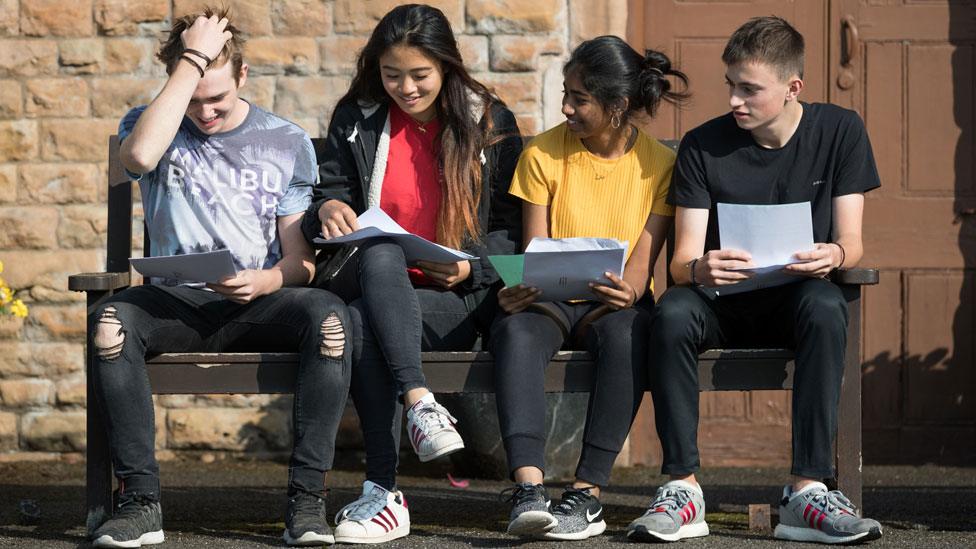GCSEs: CCEA to close the book on English literature novel study
- Published
- comments

Pupils entering Year 12 who are taking a GCSE in English literature will not have to study any novels as part of their course.
It is among changes proposed by the Council for the Curriculum, Examinations and Assessment (CCEA).
Pupils taking GCSE, AS and A-level courses will have their grades decided by exams again in 2021.
However, pupils taking GCSEs are to sit fewer exams and what they have to study on many courses will be cut.
Exams were cancelled in 2020 and pupils received GCSE, AS and A-level grades calculated by their schools instead.
That came after controversy over the original method of awarding pupils their grades partly based on standardisation by CCEA.
CCEA has published proposals to reduce what has to be taught in many GCSE subjects in the 2020/21 school year but has said public exams should take place again next summer.
"It would mean all students, regardless of their GCSE subject choices, can benefit from a reduction in the number of examinations they are required to take in summer 2021," CCEA said.
Poetry, drama and Shakespeare
In some GCSEs, units that represent up to 40% of a course will be cut.
In GCSE English literature, for example, a unit on the study of prose will be dropped.
Pupils would previously have chosen one novel to study from a range of seven, including Lord of the Flies, To Kill a Mockingbird, Animal Farm and Of Mice and Men.
However, their GCSE will now consist only of the study of poetry, drama and Shakespeare instead.
In history, a unit on international relations between 1945 and 2003 will be dropped.
CCEA has published details of elements of courses to be cut in 28 GCSEs in all.
However, GCSE courses in English language and maths - which are regarded as core qualifications - are among those that will not be changed.

The changes will only affect pupils due to sit summer exams in 2021
The proposed changes will only apply for pupils who are entering the second year of their GCSE course and due to sit exams in summer 2021.
Pupils taking AS and A-level courses will also be assessed using exams but what they are expected to study in their subjects will not be affected by cuts.
Pupils entering Year 14 and taking A-levels through CCEA will have their entire result based on exams in 2021.
"We are not proposing further reductions in either AS or A2 content at this time," CCEA said.
"The reason for this is that these young people have not, to date, missed teaching time in these courses.
"We would like to provide the opportunity for them to engage with the full course content and to gain the knowledge and skills necessary to facilitate progression to higher education."
'What drives education'
Speaking on Tuesday morning, Alliance leader Naomi Long said it was not something she had an opinion on as justice minister, but that she believed that "the love of reading is what drives education".
"In this year when we've all been restricted in terms of where we can travel and where we can go, you can open a travel book and read about places that this year we can never go," she said.
"Books open a window on the world and I just think the more we get young people engaged in reading the easier it will be for young people to be engaged in education throughout their lives."
Belfast author Glenn Patterson said he had sympathy with the both the exam board and schools.
"I can't help but think that however temporary this is, it is a significant loss for the pupils who are affected," he said.
"It is in the name, novel, they give you a new way, a new angle of coming at the world.
Student wellbeing
CCEA said any further reduction to AS and A level content would be kept under review in case there was further disruption to schools due to coronavirus.
CCEA said that they were proposing "practical and common sense changes that are a necessity in the current public health climate".
They also said they wanted to "reduce the burden of assessment on students in summer 2021 and support student wellbeing".
However, the exams board added it was preparing for other contingencies in case there was further disruption to schools.
"There is further work being taken forward to consider contingency arrangements to deal with a range of potential public health scenarios, including local lockdowns," CCEA said.
"Above all, we realise there will be a need to be flexible and that arrangements may need to evolve and change as the academic year continues."
As a result, the exams period in summer 2021 may be shorter but would still end on 30 June.
CCEA is consulting on its proposed changes and has asked for feedback by Monday, 7 September 2020.
"We fully recognise the urgent need for clarity for both teachers and students, and to support this the consultation will be open for two weeks," CCEA said.
- Published17 August 2020

- Published13 August 2020
